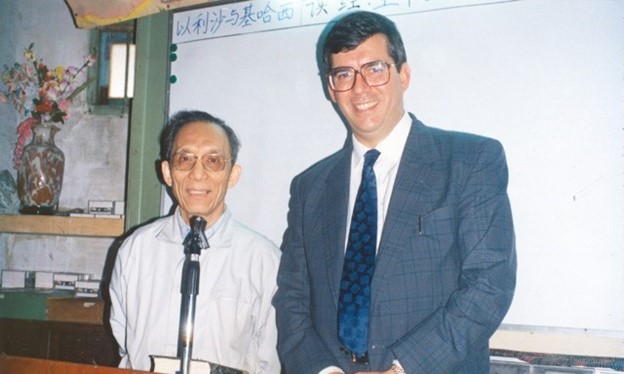<< Read all John Kamm Remembers stories
This post was originally published as part of Dui Hua’s Roots series in its June 2015 Digest.

After stepping down as President of the American Chamber of Commerce at the end of 1990, American businessman John Kamm, now executive director of The Dui Hua Foundation, stepped up his efforts to engage the Chinese government in a dialogue on human rights. In 1991, he made 11 trips to mainland China, seven of which were to cities in Guangdong Province.
His concentration on Guangdong was deliberate. It was China’s top exporter to the United States, with half of its exports destined for America. It was the principal site for foreign investment in China. Guangdong was the “home country” for the majority of Chinese Americans, whose relatives had emigrated to the United States as early as the 1840s. Since 1956, Guangdong’s capital began holding biannual export commodities fairs, and this venue soon became China’s most important window to western countries and firms wishing to do business with the country.
Kamm enjoyed deep roots to the government and people of Guangdong. Fluent in Cantonese, he had attended every Guangzhou trade fair since 1976, and had established the first foreign office in Guangzhou in 1979. He had visited every prefecture in the province and was an honorary professor at the Guangzhou Foreign Trade Institute. Professor Qian Yimin, president of the Guangzhou Foreign Trade Institute, became close friends with Kamm and closely followed Kamm’s testimony to US Congress in 1990.
Kamm approached Qian to see if the professor could win the support of Guangdong’s senior leaders for a series of fact-finding missions on three general themes: 1) the fates of individuals serving sentences in Guangdong prisons for the peaceful expression of their political and religious views; 2) the living conditions of individuals recently released from prison sentences for counterrevolutionary crimes; and 3) the conditions in the province’s prisons. Senior leaders agreed to support Kamm’s request, and the trips began in February.
Prior to Kamm’s March 1991 trip, he submitted to the prison administration department a short list of individuals serving sentences in Guangdong prisons for political and religious offenses—the first of hundreds of prisoner lists Kamm submitted to the Chinese government. The 10-name Guangdong list included Yi Danxuan and Chen Pokong (陈破空), June 4 activists who organized the obstruction of the Pearl River Bridge in protest of the suppression of the student-led protests in Beijing; Luo Haixing (罗海星), a Hong Kong trade representative who helped organize the escape from China of those fleeing the suppression of the protests, and two individuals sentenced with him, Li Peicheng and Li Longqing (李龙庆)); Democracy Wall activists Wang Xizhe (王希哲), He Qiu, and Liu Shanqing (刘山青)); and house church pastors Mai Furen and Sun Ludian.
By the end of the year, Yi Danxuan, Luo Haixing, Mai Furen, and Sun Ludian had been granted early release from prison. He Qiu and Li Shanqing were released after serving their full terms, though Liu was allowed to return to Hong Kong despite having been given a supplemental sentence of deprivation of political rights, which usually bars individuals from exiting the country. The remaining four prisoners were released in 1992 and 1993, three prior to the expiration date of their sentences. Only Chen Pokong was released after serving his full sentence.
Kamm made a point of paying several visits to individuals who had served sentences for counterrevolution and were rebuilding their lives in Guangzhou. These included the prominent house church leader Lin Xiangao, known in the West as pastor Samuel Lamb; Father Tan Tiande of the Sacred Heart Cathedral; and Li Jengtian, a leader of one of the Li Yizhe Democracy group active in Guangzhou in the mid-1970s.
Kamm visited Pastor Lamb on three occasions in his Madazhan house church located on the second floor of a “shop-house” in the old city. At the time, Lamb was holding four services a day, attracting 400 worshippers at each service. A few months before Kamm began his visits, police had raided the church and confiscated its bibles. When Kamm arrived for his first visit he had to pass through a police post on the ground floor.
Gaining access to Father Tan also proved difficult. A representative of the local Catholic Patriotic Association initially refused to let Kamm see the elderly cleric, but Kamm sought a meeting with the officially recognized bishop of Guangzhou, who ultimately approved the meeting with Father Tan. Both Pastor Lamb and Father Tan had spent more than 20 years in labor camps for their faith.
In addition to handing over his first prisoner list in 1991, Kamm made his first visits to Chinese prisons. In May, he visited the Guangzhou Juvenile Prison in Shi Qing and witnessed young people assembling radios for export to Southeast Asia. In October Kamm toured the Meixian Prison in northeast Guangdong, where he was informed that pastors Sun and Mai had recently been released on medical parole due to their old age.
Listen to the Encounters with China podcast.
Subscribe to receive notifications about new episodes.
Read all John Kamm Remembers stories.
